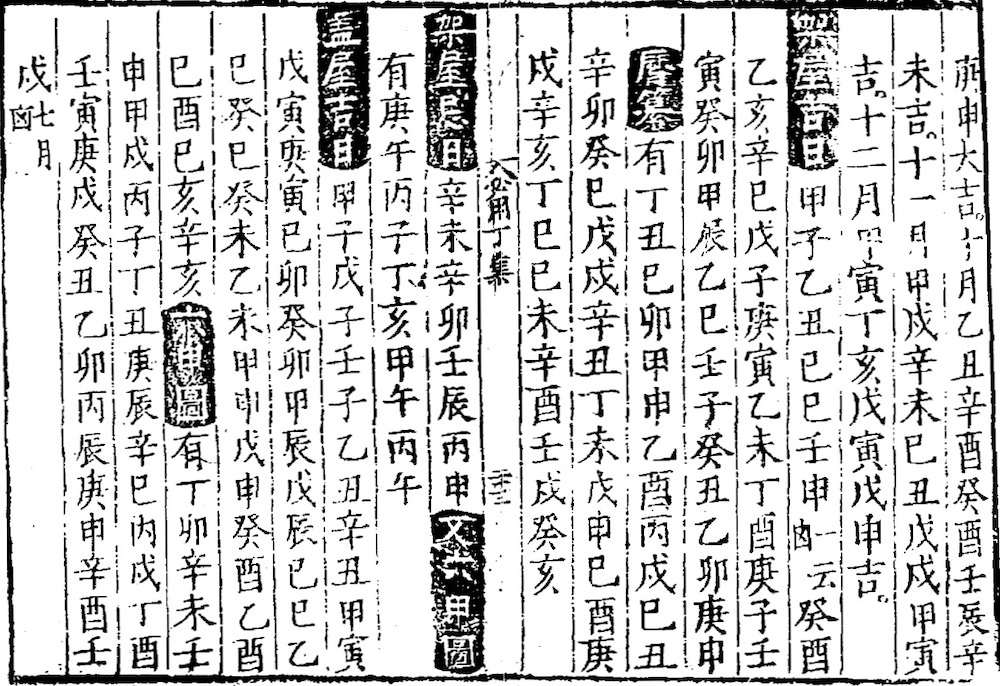Jujia biyong shilei quanji 居家必用事類全集 is domestic-use encyclopaedia focusing on aspects of daily life. It was compiled by an unknown person during the mid-Yuan period 元 (1279-1368). Huang Yuji's 黃虞稷 (1629-1691) hypothesis (in Qianqingtang shumu 千頃堂書目) is that the author was Xiong Zongli 熊宗立 (1409-1482), but Xiong was only the editor of one version of the book, not its author. Shao Yichen 邵懿辰 (1810-1861), who wrote a book on traditional bibliography, Siku jianming shumu biaozhu 四庫簡明目錄標注, holds that the author was Li Zi 李梓. Text from the encyclopaedia is in great numbers quoted in the official encyclopaedia Yongle dadian 永樂大典.
It consists of ten collections (ji 集) numerated according to the ten celestial stems. Xiong's edition consists of 10 main juan and 4 juan of appendix. The topics dealt with in the collections are rituals, ceremonies, education, agriculture and sericulture, technical skills, the assessment of tea and tea water, eating and drinking, etc. It even includes full texts like the book Lixue zhinan 吏學指南 (Collection VIII), which was compiled in 1301.
The encyclopaedia is of particular interest because it quotes from numerous text that are already lost. Another aspect is the linguistic one. A closer analysis of the lexicon (Song 2016) shows that the book makes use of many vernacular expressions not found in standard literature.
Chapter 1 (Jia ji 甲集) deals with scholarship like learning, reading, writing, etc. The second part (Yi ji 乙集) is an overview of family or household rituals. Part three (Bing ji 丙集) explains public matters. The fourth fascicle (Ding ji 丁集) consists of two parts, of which the first inform the reader about the construction of buildings and lists auspicious and inauspicious dates for these procedures, while the second part describes important matters of animal husbandry – also with providing auspicious dates for related actions. Part V (Wu ji 戊集) goes on to agricultural activities, with grains, hemp, mulberry, sericulture, medical herbs, legumes and vegetables, fruits and bamboos. In the first sections, the farmer is also provided with lucky days for specific actions. The last part of the chapter describes objects of the household, from candles and lighters to the tools of the study (inkstone, brush), collectibles, and jewelry. The sixth part of the book (Ji ji 己集) is related to tea and wine, and then goes over to food and cooking, a section which continues in part VII (Geng ji 庚集), which then proceeds to dyeing and washing of textiles, odours and fragrances, as well as cosmetics. Fascicle number 8 (Xinji 辛集) includes the Lixue zhinan, and another text on local administration, Weizheng jiuyao 為政九要). The last two parts (Ren ji 壬集 and Kui ji 癸集) present information on diet, medicine, and physical and mental care.
The chapter on domestic animals and animal care is interesting because the book provides a chart for "horse inspection" (xiangma tu 相馬圖) and an accompanying poem (xiangma gejue 相馬歌訣). The part on bovines and chicken are not thus detailed. Quite outstanding are the descriptions on fattening chicken and geese with methods still used today. The book explains how to eliminate with the help of ants a certain vermin damaging citrus fruits. Pests on fruit and mulberry trees could be avoided by heating the trunks of the trees on New Year's dawn. The author(s) recommend to plant mulberry trees together with tea bushes and hemp. A special chapter enlightens the methods to rate the quality of tea according to colour, odour, and taste.
 |
Auspicious and inauspicious days for the construction of roofs. 1568 edition. |
A very metaphysical interpretation of human life is given in the chapters on physical and mental care, where the book says that human life was divided into three stages, namely the celestial stage (tianyuan 天元) of 60 years, the terrestrial stage (diyuan 地元) of 60 years, and the human stage (renyuan 人元 ) of 60 years, making a total of 180 years of "lifespan", not in sequence, but parallel. In the course of the celestial stage, the length of "leakings [of spirit]" (xie 泄) becomes longer, namely from 4 days at the age of 20 to 20 at the age of 50, and in old age, these leakings end. The book also gives recommendations for marriage, sexual life, and pregnancy. The terrestrial stage has a lot to do with temper and character, hygiene, and physical conditions. The human stage finally refers to the consumption of food. Even if many aspects of these statements are pure superstition, others can be proven by modern, scientific medicine.
The most widespread edition dates, according to the preface, from 1568 (Silijian edition 司禮監刊本). Another edition dates from 1560, and one from the very late 16th century. The Nanjing Library 南京圖書館 owns a book from the mid-16th century which has the title Riyong bianlan shilei quanji 日用便览事类全集, many chapters of which are identical with the Jujia biyong text. The book was also transferred to Japan, with an edition from 1673, and to Korea. The encyclopaedia is included in the series Xuxiu siku quanshu 續修四庫全書.
| 1. | 室廬 | Buildings and huts |
| 2. | 花木 | Flowers and trees |
| 3. | 水石 | Waters and stones |
| 4. | 禽魚 | Birds and fishes |
| 5. | 書畫 | Calligraphy and painting |
| 6. | 几榻 | Furniture |
| 7. | 器具 | Tools and implements |
| 8. | 衣飾 | Clothes and adornment |
| 9. | 舟車 | Boats and carts |
| 10. | 位置 | Interior design |
| 11. | 蔬果 | Vegetables and fruits |
| 12. | 香茗 | Fragrances and teas |